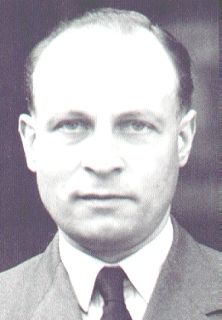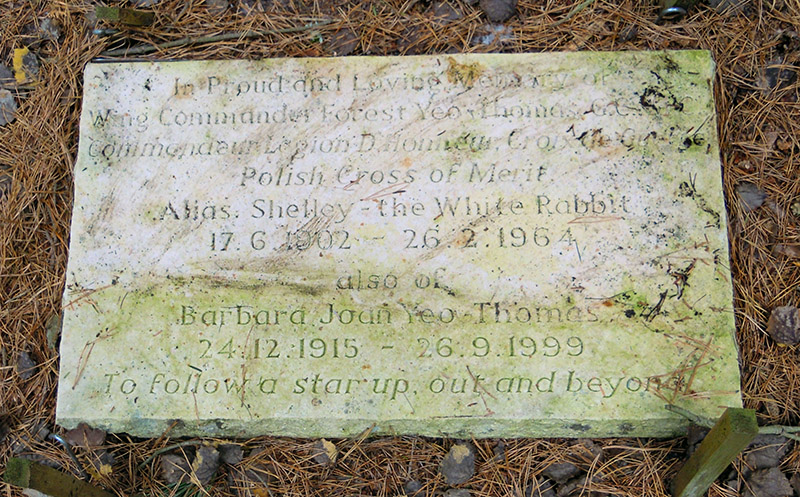Yeo-Thomas, Forest Frederick Edward "White Rabbit"
- Date of birth:
- June 17th, 1901 (Holborn, London, Great Britain)
- Date of death:
- February 26th, 1964 (Paris, France)
- Buried on:
- Brookwood Cemetery
- Service number:
- 89215
- Nationality:
- British
Biography
Do you have more information about this person? Inform us!
- Period:
- Second World War (1939-1945)
- Rank:
- Flight Lieutenant
- Unit:
- RF Section, Special Operations Executive (SOE), British Government
- Awarded on:
- March 14th, 1944
- Awarded for:
- Operation Seahorse
- Period:
- Second World War (1939-1945)
- Rank:
- Flight Lieutenant
- Unit:
- RF Section, Special Operations Executive (SOE), British Government
- Awarded on:
- May 16th, 1944
Recommendation:
"This officer was despatched to the field on the 17th September, 1943, with the mission of examining the current situation bad state of preparation of certain plans, and bringing back a report to this country.
Shortly after his arrival in France a critical situation developed as a result of which numerous arrests of patriots took place. Despite extreme personal risk Flight Lieutenant YEO-THOMAS continued his enquiries and was able to obtain information of the utmost importance to the authorities charged with the rectification of the situation in the field and "sealing off" of the gaps left by the arrests of the organisers.
On six occasions he narrowly escaped capture by the Gestapo by skill and forethought, but conscientiously continued his duties until formally ordered to return to this country, which he did on the night of 15/16th November, 1943.
Besides the accomplishment of his mission, this officer rescued British intelligence archives from a house under surveillance by the Gestapo and brought them safely back to this country."
Second MC awarded as a bar to be worn on the ribbon of the first MC.
"This officer was despatched to the field on the 17th September, 1943, with the mission of examining the current situation bad state of preparation of certain plans, and bringing back a report to this country.
Shortly after his arrival in France a critical situation developed as a result of which numerous arrests of patriots took place. Despite extreme personal risk Flight Lieutenant YEO-THOMAS continued his enquiries and was able to obtain information of the utmost importance to the authorities charged with the rectification of the situation in the field and "sealing off" of the gaps left by the arrests of the organisers.
On six occasions he narrowly escaped capture by the Gestapo by skill and forethought, but conscientiously continued his duties until formally ordered to return to this country, which he did on the night of 15/16th November, 1943.
Besides the accomplishment of his mission, this officer rescued British intelligence archives from a house under surveillance by the Gestapo and brought them safely back to this country."
Second MC awarded as a bar to be worn on the ribbon of the first MC.
- Period:
- Second World War (1939-1945)
- Rank:
- Acting Wing Commander
- Unit:
- RF Section, Special Operations Executive (SOE), British Government
- Awarded on:
- February 15th, 1946
Citation:
"This officer was parachuted into France on the 25th February, 1943. He showed much courage and initiative during his mission, particularly when he enabled a French officer who was being followed by a Gestapo agent in Paris to reach safety and resume clandestine work in another area. He also took charge of a U.S. Army Air Corps officer who had been shot down and, speaking no French, was in danger of capture. This officer returned to England on the 15th April,1943, in the aircraft which picked up Wing Commander Yeo-Thomas.
Wing Commander Yeo-Thomas undertook a second mission on the 17th September, 1943. Soon after his arrival in France many patriots were arrested. Undeterred, he continued his enquiries and obtained information which enabled the desperate situation to be rectified. On six occasions he narrowly escaped arrest. He returned to England on the 15th November, 1943, bringing British intelligence archives which he had secured from a house watched by the Gestapo.
This officer was again parachuted into France in February, 1944. Despite every security precaution he was betrayed to the Gestapo in Paris on the 21st March. While being taken by car to Headquarters he was badly beaten up. He then underwent 4 days continuous interrogation, interspersed with beatings and torture, including immersions, head downwards, in ice-cold water, with legs and arms chained. Interrogations later continued for 2 months and Wing Commander Yeo-Thomas was offered his freedom in return for information concerning the Head of a Resistance Secretariat. Owing to his wrist being cut by chains, he contracted blood-poisoning and nearly lost his left arm. He made two daring but unsuccessful attempts to escape. He was then confined in solitude in Fresnes prison for 4 months, including 3 weeks in a darkened cell with very little food.
Throughout these months of almost continuous torture, he steadfastly refused to disclose any information. On the 17th July 1944, Wing Commander Yeo-Thomas was sent with a party to Compiegne prison, from which he twice attempted to escape. He and 36 others were then transferred to Buchenwald. On the way, they stopped for 3 days at Saarbrucken, where they were beaten and kept in a tiny hut.
They arrived at Buchenwald on the 16th August 1944 and 16 of them were executed and cremated on the 10th September. Wing Commander Yeo-Thomas had already commenced to organise resistance within the camp and remained undaunted by the prospect of a similar fate. He accepted an opportunity of changing his identity with that of a dead French prisoner, on condition that other officers would also be enabled to do so. In this way, he was instrumental in saving the lives of two officers.
Wing Commander Yeo-Thomas was later transferred to a work kommando for Jews. In attempting to escape he was picked up by a German patrol and, claiming French nationality, was transferred to a camp near Marienburg for French prisoners of war. On the 16th April,1945, he led a party of 20 in a most gallant attempt to escape in broad daylight. 10 were killed by fire from the guards. Those who reached cover split up into small groups. Wing Commander Yeo-Thomas became separated from his companions after 3 days without food. He continued alone for a week and was recaptured when only a few yards from the American lines. A few days later he escaped with a party of 10 French prisoners of war, whom he led through German patrols to the American lines.
Wing Commander Yeo-Thomas thus turned his final mission into a success by his determined opposition to the enemy, his strenuous efforts to maintain the morale of his fellow-prisoners and his brilliant escape activities. He endured brutal treatment and torture without flinching and showed the most amazing fortitude and devotion to duty throughout his service abroad, during which he was under the constant threat of death."
"This officer was parachuted into France on the 25th February, 1943. He showed much courage and initiative during his mission, particularly when he enabled a French officer who was being followed by a Gestapo agent in Paris to reach safety and resume clandestine work in another area. He also took charge of a U.S. Army Air Corps officer who had been shot down and, speaking no French, was in danger of capture. This officer returned to England on the 15th April,1943, in the aircraft which picked up Wing Commander Yeo-Thomas.
Wing Commander Yeo-Thomas undertook a second mission on the 17th September, 1943. Soon after his arrival in France many patriots were arrested. Undeterred, he continued his enquiries and obtained information which enabled the desperate situation to be rectified. On six occasions he narrowly escaped arrest. He returned to England on the 15th November, 1943, bringing British intelligence archives which he had secured from a house watched by the Gestapo.
This officer was again parachuted into France in February, 1944. Despite every security precaution he was betrayed to the Gestapo in Paris on the 21st March. While being taken by car to Headquarters he was badly beaten up. He then underwent 4 days continuous interrogation, interspersed with beatings and torture, including immersions, head downwards, in ice-cold water, with legs and arms chained. Interrogations later continued for 2 months and Wing Commander Yeo-Thomas was offered his freedom in return for information concerning the Head of a Resistance Secretariat. Owing to his wrist being cut by chains, he contracted blood-poisoning and nearly lost his left arm. He made two daring but unsuccessful attempts to escape. He was then confined in solitude in Fresnes prison for 4 months, including 3 weeks in a darkened cell with very little food.
Throughout these months of almost continuous torture, he steadfastly refused to disclose any information. On the 17th July 1944, Wing Commander Yeo-Thomas was sent with a party to Compiegne prison, from which he twice attempted to escape. He and 36 others were then transferred to Buchenwald. On the way, they stopped for 3 days at Saarbrucken, where they were beaten and kept in a tiny hut.
They arrived at Buchenwald on the 16th August 1944 and 16 of them were executed and cremated on the 10th September. Wing Commander Yeo-Thomas had already commenced to organise resistance within the camp and remained undaunted by the prospect of a similar fate. He accepted an opportunity of changing his identity with that of a dead French prisoner, on condition that other officers would also be enabled to do so. In this way, he was instrumental in saving the lives of two officers.
Wing Commander Yeo-Thomas was later transferred to a work kommando for Jews. In attempting to escape he was picked up by a German patrol and, claiming French nationality, was transferred to a camp near Marienburg for French prisoners of war. On the 16th April,1945, he led a party of 20 in a most gallant attempt to escape in broad daylight. 10 were killed by fire from the guards. Those who reached cover split up into small groups. Wing Commander Yeo-Thomas became separated from his companions after 3 days without food. He continued alone for a week and was recaptured when only a few yards from the American lines. A few days later he escaped with a party of 10 French prisoners of war, whom he led through German patrols to the American lines.
Wing Commander Yeo-Thomas thus turned his final mission into a success by his determined opposition to the enemy, his strenuous efforts to maintain the morale of his fellow-prisoners and his brilliant escape activities. He endured brutal treatment and torture without flinching and showed the most amazing fortitude and devotion to duty throughout his service abroad, during which he was under the constant threat of death."
- Period:
- Second World War (1939-1945)
- Unit:
- RF Section, Special Operations Executive (SOE), British Government
- Awarded on:
- July 1963
- Period:
- Second World War (1939-1945)
- Period:
- Second World War (1939-1945)
- Period:
- Second World War (1939-1945)
- Period:
- Second World War (1939-1945)
- Period:
- Second World War (1939-1945)
- Unit:
- RF Section, Special Operations Executive (SOE), British Government
- Period:
- Second World War (1939-1945)
- Unit:
- RF Section, Special Operations Executive (SOE), British Government
- Period:
- Second World War (1939-1945)
- Unit:
- RF Section, Special Operations Executive (SOE), British Government
Sources
- Photo 2: Wikimedia Commons (CC Attribution 3.0)
- Photo: George Cross Database
- - Third Supplement to The London Gazette Issue 36423 published on the 10 March 1944
- Fourth Supplement to The London Gazette Issue 36516 published on the 12 May 1944
- Third Supplement to The London Gazette Issue 37468 published on the 12 February 1946
- Stephen's Study Room















